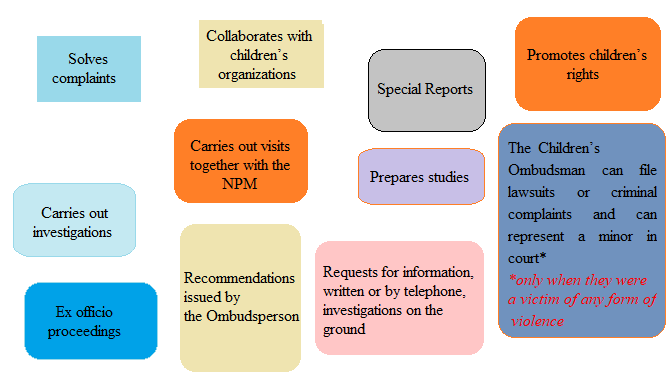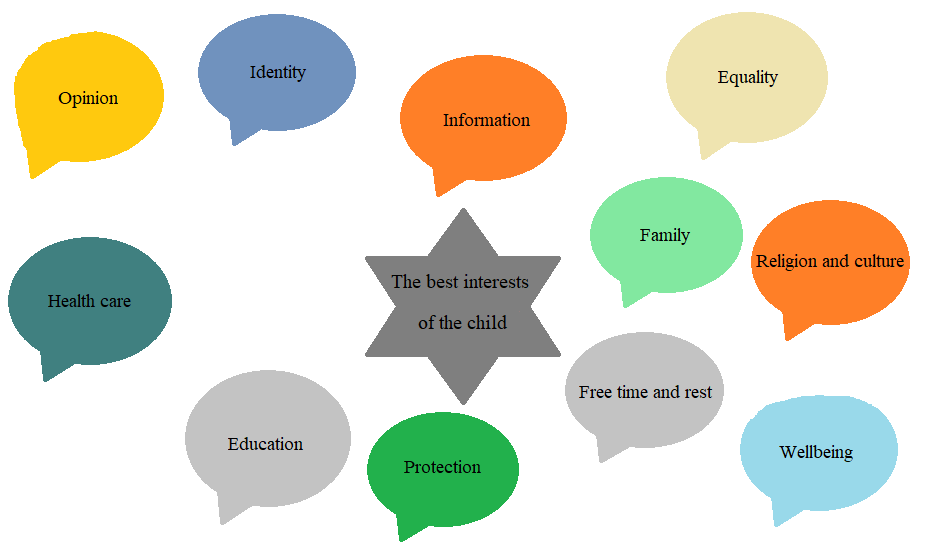What does the Children’s Ombudsman do?
The Children’s Ombudsman defends the rights of children up to the age of 18, supports and encourages the observance and promotion of their rights.
The Children’s Ombudsman intervenes in situations regarding physical, mental, sexual abuse, disappearances of children, bullying, poverty, the situation in placement centers, relationships in schools and kindergartens, integration of children with disabilities, maintaining personal ties between children and the people to whom they are attached, the situation of children with parents who went to work abroad, as well as in any situation where children’s rights are not respected.


! The People’s Advocate does NOT have the power of legislative initiative, however when it finds gaps in legislation or serious cases of corruption or non-compliance with the laws of the country, it can draw up a special report, which will be presented to the Presidents of the two Houses of Parliament or, as the case may be, to the Prime Minister.
Who can contact the Children’s Ombudsman?
• Children – any child who considers that their rights are not respected
• Anyone who is aware of a possible violation of children’s rights
Children’s rights
All children should know that they have the same rights as adults, but they need special attention and protection, as they are more vulnerable due to age.

What do these rights mean?
-
- The best interests of the child – in all decisions regarding children, the institutions, organizations and all adults involved must think first and foremost about what is best for children and act accordingly.
- Family – children have the right to know their parents and to grow up with them, except in cases where they do not take proper care of the child and endanger them;
- if the parents are separated, the child has the right to keep in touch with both parents, but also with the people to whom they are attached;
- any child who is deprived of his own family has the right to be protected and to grow up in another family or in a similar environment.
-
- Education – children have the right to attend school and, together with their parents, to choose their school and profile of the school, depending on their abilities and interests
- Health care – children have the right to receive medical care and be protected from the harmful effects of alcohol, tobacco and drugs
- Religion and culture – children have the right to have the same religion as the family they belong to, to know the language and customs of their own family, even if they are different from those of other people around them;
- Identity – all children have the right to have identity documents – birth certificate, which mentions the name and surname, date and place of birth, parents’ names, citizenship and, after reaching the age of 14, identity card;
- Equality – children must be treated equally, regardless of race, sex, language or religion, opinion, country of origin, material situation, physical capacity, ethnicity.
- Wellbeing – children have the right to a place to live, to food, to clothing, to an environment in which they can develop harmoniously; children cannot be forced to work;
- Protection – children have the right to be protected against any form of violence
- Opinion – children have the right to express their own opinion when adults make decisions that influence the child’s life; children should be encouraged to express their opinions and adults to listen to them and take them into account;
- Information – children have the right to be informed about their rights, as well as about how they can enjoy their rights; children have the right to file their own complaints about the violation of their rights;
- Free time and rest – all children should have free time to spend doing different activities, specific to age and interest.
Collaborations and partnerships:
-
- UNICEF Romania
- “Save the Children” Organization Romania
- Federation of Non-Governmental Organizations for Children – FONPC
- Romanian Academic Society (SAR)
- “Child’s Phone” Association
- Itsy Bitsy radio station
- “World Vision” Foundation Romania
LEGISLATION
– Law no. 35/1997 on the organization and functioning of the People’s Advocate institution
– Law no. 272/2004 on the protection and promotion of children’s rights
– Law no. 273/2004 on the adoption procedure
– National education law no. 1/2011
– UN Convention on the Rights of the Child
– Council of Europe Convention for the Protection of Children against Sexual Exploitation and Sexual Abuse